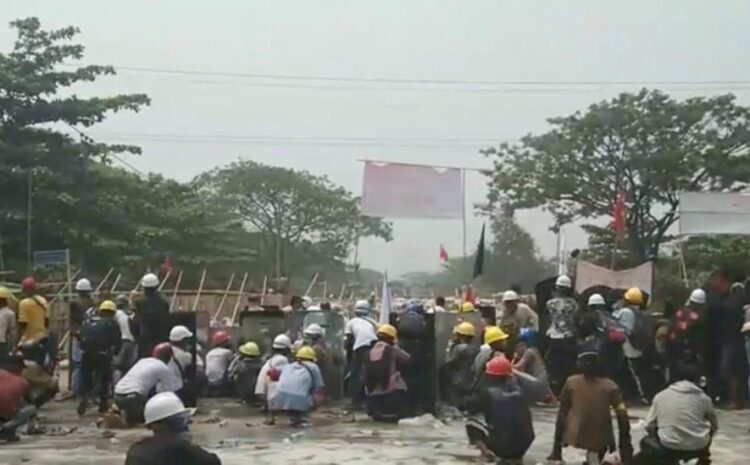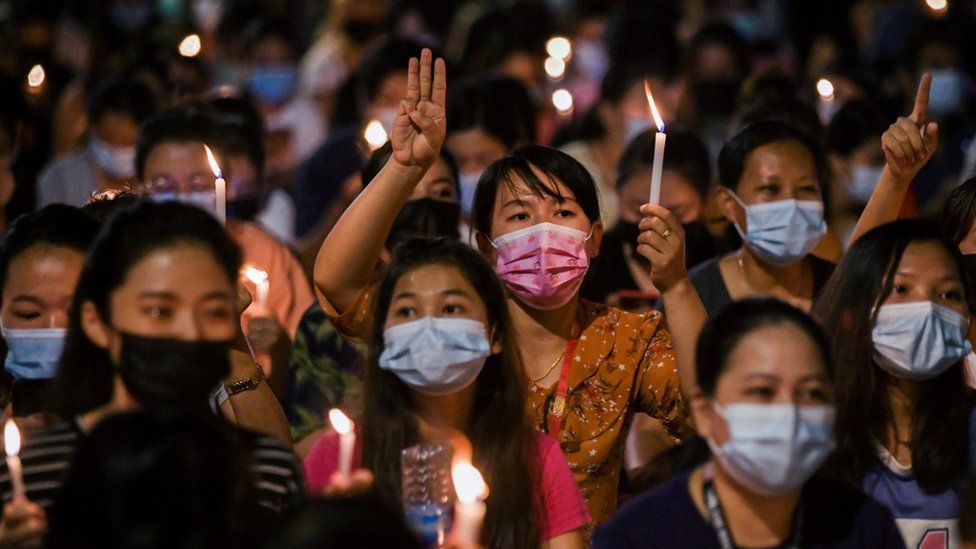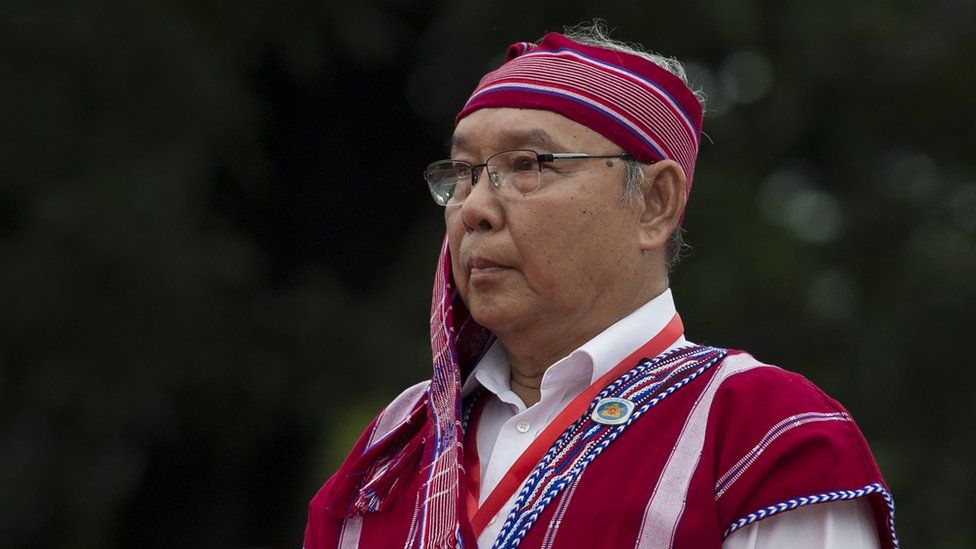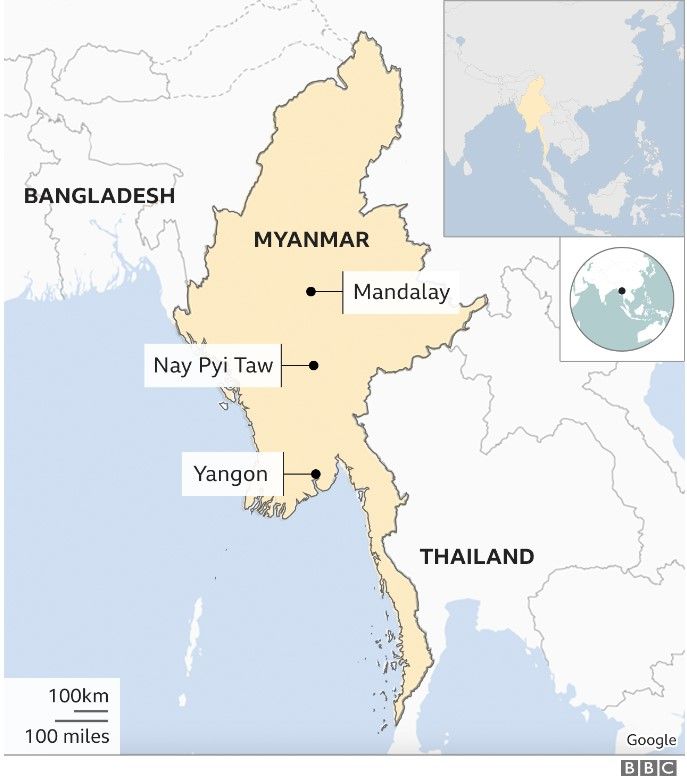
REUTERS image captionSecurity forces used live rounds against protesters in Hlaing Tharyar
At least 14 protesters have been killed in clashes in Myanmar’s main city Yangon as politicians ousted by the military coup called for “revolution”.
Security forces opened fire in the Yangon area of Hlaing Tharyar as protesters used sticks and knives.
The junta declared martial law in the area after Chinese businesses were attacked. Protesters believe China is giving support to the Burmese military.
Myanmar has been gripped by protests since the military coup on 1 February.
Military rulers have detained Aung San Suu Kyi, the country’s civilian leader and head of the National League for Democracy (NLD) party.
The NLD won a landslide in last year’s election but the military alleged there had been widespread fraud.
In his first public address, their leader Mahn Win Khaing Than urged protesters to defend themselves against the military crackdown during what he called a “revolution”.
“This is the darkest moment of the nation and the moment that the dawn is close,” he said.
What happened in Hlaing Tharyar?
The junta has declared martial law in Hlaing Tharyar and neighbouring Shwepyitha after China said Chinese factories in the area had been targeted and demanded protection.
Beijing said people armed with iron bars, axes and petrol burned and damaged 10 Chinese factories in Yangon. A Chinese hotel was also attacked.
On its Facebook page the Chinese embassy said some “factories were looted and destroyed and many Chinese staff were injured and trapped”.
Gunshots were heard throughout the day and military trucks were seen in the streets.
One police officer posted on social media that police were planning to use heavy weaponry.
“I will not have mercy on Hlaing Tharyar and they will fight back seriously too because there are all kinds of characters there,” the officer said in the subsequently deleted TikTok post.
At least 14 protesters were killed, according the Myanmar Now website, while other local reports said the toll was higher.
“Three died in front of me while I was giving treatment. I’m sending another two to hospital. That’s all I can say at this moment,” one medic told AFP.
 IMAGE COPYRIGHTREUTERS
IMAGE COPYRIGHTREUTERSSeveral other deaths at the hands of the military were reported in other parts of Myanmar, including a young man shot dead by security forces in the northern jade-producing city of Hpakant and a man killed in Bago to the north of Yangon.
Meanwhile state TV said one police officer had been killed. Three more were injured by protesters throwing rocks and using catapults in the Bago region, MRTV said.
In total, more than 80 protesters have been killed during the crackdown, according to a local monitoring group.
What did Mahn Win Khaing Than say?
NLD MPs who managed to escape arrest after the coup formed a new group, the CRPH, or Committee for Representing the Union Parliament.
Mahn Win Khaing Than was appointed the CRPH’s acting head and the group is seeking international recognition as Myanmar’s rightful government.
In a speech on Facebook, Mahn Win Khaing Than said: “This is the time for our citizens to test their resistance against the dark moments.
“In order to form a federal democracy, which all ethnic brothers who have been suffering various kinds of oppressions from the dictatorship for decades really desired, this revolution is the chance for us to put our efforts together.
 IMAGE COPYRIGHT GETTY IMAGES
IMAGE COPYRIGHT GETTY IMAGES“Despite our differences in the past, this is the time we must grip our hands together to end the dictatorship for good. ”
The military considers the CRPH to be an illegal group, warning that anyone co-operating with them will face treason charges.
What’s the background?
Independent international observers have disputed the military’s claim of the fraudulent election held in November 2020, saying no irregularities were observed.
Last week, the military accused Ms Suu Kyi of illegally accepting $600,000 (£430,000) and 11kg of gold. No evidence was provided and an NLD lawmaker denied the allegation.
Ms Suu Kyi has been held for the past five weeks at an undisclosed location and faces several other charges including causing “fear and alarm”, illegally possessing radio equipment, and breaking Covid-19 restrictions.
Since the coup the military has used violent force to try to quell protests, leaving dozens dead and prompting widespread international condemnation.
The US has announced sanctions on coup leaders, while steps are also being taken to block access by the military to $1bn of government funds held in the US.
The military has dismissed criticism of its actions, instead blaming Ms Suu Kyi for the violence.

Myanmar profile
- Myanmar became independent from Britain in 1948. For much of its modern history, it has been under military rule
- Restrictions began loosening from 2010 onwards, leading to free elections in 2015 and the installation of a government led by veteran opposition leader Aung San Suu Kyi the following year
- In 2017, Myanmar’s army responded to attacks on police by Rohingya militants with a deadly crackdown, driving more than half a million Rohingya Muslims across the border into Bangladesh in what the UN later called a “textbook example of ethnic cleansing”
- Country profile


